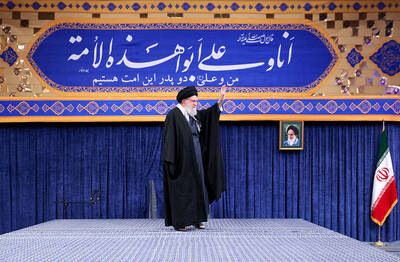For all the stern words from Washington about possible military action against Iran if it fails to rein in its nuclear ambitions, the US would almost certainly have to mount such a campaign without the backing of Britain, its staunchest ally in Iraq, according to experts.
On Monday, US President George W. Bush said he could not rule out using force if Washington was unable to persuade Tehran to abandon a nuclear energy program it charges is cover for developing atomic weapons, while secretary of state-designate Condoleezza Rice called for world action on the issue.
A report in the New Yorker magazine this week said US commandos had been operating inside Iran since the middle of last year to search out potential targets for attack.
Overall, the Bush administration "recognizes that a military attack against Iran's military facilities is not a very attractive option," said Gary Samore, a specialist on Iran at the International Institute of Strategic Studies think tank in London.
"There are many drawbacks, both practical and political," Samore told reporters, adding that the Pentagon was undoubtedly "examining the options for a pre-emptive military strike" against Iran's nuclear and missile facilities.
A game of diplomatic bluff was underway, with Washington hopeful that the threat of military action might pressure Britain and other European Union nations to negotiate forcefully with a worried Tehran so as to head off war, he explained.
"In a way, the American threat to bomb Iran is also indirect pressure on Europe to do its very best, to achieve a diplomatic solution," he said, adding that Bush would find it extremely difficult to find backing in Europe for military action.
"Even if British officials recognize that the threat of a military attack may help their diplomatic efforts with Iran, I have not been able to find a British official, much less French or German, who thinks that a military attack actually makes sense," he said.
"My guess is that the British government would at best be silent, at worst be opposed."
Much would depend "on who the British hold responsible for the failure of diplomacy," he added.
"If the British feel that the US has been unreasonable and unsupportive of British diplomatic efforts, then obviously London will be less inclined to support the US."
British Prime Minister Tony Blair, whose popularity has been badly dented by his decision to back the US-led conflict in Iraq, would be extremely wary of getting his nation involved in another conflict, added Katarina Dalacoura from the International Relations department at the London School of Economics.
It "would not make sense for [the British government] to do that, especially given all the flak they have received over Iraq," she said.

Shamans in Peru on Monday gathered for an annual New Year’s ritual where they made predictions for the year to come, including illness for US President Donald Trump and the downfall of Venezuelan President Nicolas Maduro. “The United States should prepare itself because Donald Trump will fall seriously ill,” Juan de Dios Garcia proclaimed as he gathered with other shamans on a beach in southern Lima, dressed in traditional Andean ponchos and headdresses, and sprinkling flowers on the sand. The shamans carried large posters of world leaders, over which they crossed swords and burned incense, some of which they stomped on. In this

Indonesia yesterday began enforcing its newly ratified penal code, replacing a Dutch-era criminal law that had governed the country for more than 80 years and marking a major shift in its legal landscape. Since proclaiming independence in 1945, the Southeast Asian country had continued to operate under a colonial framework widely criticized as outdated and misaligned with Indonesia’s social values. Efforts to revise the code stalled for decades as lawmakers debated how to balance human rights, religious norms and local traditions in the world’s most populous Muslim-majority nation. The 345-page Indonesian Penal Code, known as the KUHP, was passed in 2022. It

‘TRUMP’S LONG GAME’: Minnesota Governor Tim Walz said that while fraud was a serious issue, the US president was politicizing it to defund programs for Minnesotans US President Donald Trump’s administration on Tuesday said it was auditing immigration cases involving US citizens of Somalian origin to detect fraud that could lead to denaturalization, or revocation of citizenship, while also announcing a freeze of childcare funds to Minnesota and demanding an audit of some daycare centers. “Under US law, if an individual procures citizenship on a fraudulent basis, that is grounds for denaturalization,” US Department of Homeland Security Assistant Secretary Tricia McLaughlin said in a statement. Denaturalization cases are rare and can take years. About 11 cases were pursued per year between 1990 and 2017, the Immigrant Legal Resource

ANGER: US-based activists reported protests at 174 locations across the country, with at least 582 arrested and 15 killed, while Khamenei said the protesters were ‘paid’ Iran’s supreme leader on Saturday said that “rioters must be put in their place” after a week of protests that have shaken the Islamic Republic, likely giving security forces a green light to aggressively put down the demonstrations. The first comments by 86-year-old Ayatollah Ali Khamenei come as violence surrounding the demonstrations sparked by Iran’s ailing economy has killed at least 15 people, according to human rights activists. The protests show no sign of stopping and follow US President Donald Trump warning Iran on Friday that if Tehran “violently kills peaceful protesters,” the US “will come to their rescue.” While it remains